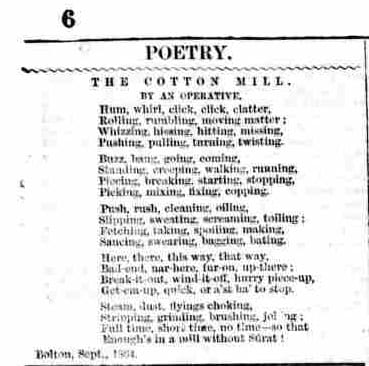
VII: “The Cotton Mill”
Published in the poetry column of the Bolton Chronicle, 24 September 1864, this poem is signed “An Operative”, Bolton, September 1864. It brilliantly represents the noise of the mill and the constant motion of the machines, using technical language and sliding into Lancashire dialect (“a’st ha’” – “all will have”) at the end of the fourth stanza. The closing reference to “surat” is to the cotton that was imported from India during the Cotton Famine of the 1860s, when U.S. imports were drastically affected by the Civil War. Surat cotton was very unpopular with workers as it was far harder to work with, and their wages depended on rapid production.
This poem is included in the “Poetry of the Lancashire Cotton Famine” project, which provides further background on poetry by mill-workers in this region of Britain.
Hum, whirl, click, click, clatter,
Rolling, rambling, moving matter:
Whizzing, hissing, hitting, missing,
Pushing, pulling, turning, twisting.
Buzz, bang, going, coming,
Standing, creeping, walking, running,
Piecing, breaking, starting, stopping,
Picking, mixing, fixing, copping.
Push, rush, cleaning, oiling,
Slipping, sweating, screaming, toiling:
Fetching, taking, spoiling, making,
Saucing, swearing, bagging, bating.
Here, there, this way, that way,
Bad-end, nar-here, fur-on, up-there;
Break-it-out, wind-it-off, hurry piece-up,
Get-em-up, quick, or a’st ha’ to stop.
Steam, dust, flyings choking,
Stripping, grinding, brushing, jolting;
Full time, short time, no time – so that
Enough’s in a mill without Surat!
